HZJZ: Quarantine Mandate Lifted for All, Second Booster Dose Recommended for Elderly
ZAGREB, 13 April 2022 - The quarantine mandate is being lifted for all people who have been in contact with a COVID-positive person, and a second booster dose is being introduced for people aged 80 and above and for nursing home residents aged 65 and above, the Croatian Public Health Institute (HZJZ) announced on Wednesday.
"In Croatia, the number of new cases per million people is now 221 on average, hospitalisations are rapidly falling, with slightly over 500 people currently being treated in hospital, and the daily number of deaths over the past several days has been below 10", HZJZ director Krunoslav Capak said.
"All these stable epidemiological indicators allow us to ease the restrictions on the one hand, and recommend extra caution and security to our elderly, most vulnerable citizens on the other," Capak said, adding that the European Centre for Disease Prevention and Control and the European Medicines Agency have issued a joint recommendation for a second booster dose for the elderly.
The fourth dose or the second booster dose should be administered at least four months after the first booster dose, and the mRNA vaccine of Pfizer or Moderna should be used for this purpose. The second booster dose is also recommended to persons with an increased risk of developing serious forms of the COVID-19 disease who have been immunised with the Janssen vaccine.
As for the quarantine mandate, the HZJZ said that persons who have been in contact with a COVID-infected person need not quarantine any more, regardless of their vaccination status or whether or not they have recovered from COVID-19, but must wear a face mask for 10 days after their last contact and self-test on the fifth day. They must also avoid any large gatherings and contacts with people at risk of developing serious forms of COVID-19.
For all you need to know about coronavirus specific to Croatia, make sure to bookmark our dedicated section and select your preferred language if it isn't English.
Plenkovic Wants Coronavirus Red List To Take Counties Into Account
ZAGREB, Aug 31, 2020 - Croatian Prime Minister Andrej Plenkovic said on Monday that he would talk with Slovenian PM Janez Jansa about putting counties and not countries on the coronavirus red list.
Plenkovic and six other European prime ministers are attending the Bled Strategic Forum, and on the fringes, he will meet with Jansa and Hungarian PM Viktor Orban.
Speaking to the press, Andrej Plenkovic said the meetings would discuss "joint efforts to reduce infection and its cross-border effects."
In mid-August, Slovenia put Croatia on the coronavirus red list, which means mandatory quarantine for anyone arriving from Croatia. In order to avoid quarantine, many Slovenian tourists left Croatia.
"Our position is to attempt, notably in Slovenia, not just because of Croatia but also for the sake of numerous Slovenians who are our frequent and dear quests, to see the county level of infection as a criterion, something like Germany has done. I think there is room for that and that that is the best option."
He said the Bled Strategic Forum, the most important foreign policy event in Slovenia, was a good opportunity for European states to analyze their management of the coronavirus pandemic so far.
We can slowly sum up what has been good since January, he said, "what we have done well together, and how to respond together in the future when it comes to a vaccine, the procurement of medical and protective equipment."
Slovenian reporters asked him if he and Jansa would discuss the territorial dispute between the two neighboring states.
"Our position has been clear the entire time. We had Slovenia's initiative before the European Court in Luxembourg and you saw the decision, that it's not competent. We are still willing to talk about the border with Slovenia and our stance has not changed during my whole term," Plenkovic said, adding that it was necessary to find a "good, sustainable solution acceptable to both countries."
The 15th Bled Strategic Forum is focusing on Europe after Brexit and COVID-19. Also attending are Czech PM Andrej Babis, Polish PM Mateusz Morawiecki, Bulgarian PM Boyko Borissov, and Serbian President Aleksandar Vucic. Italian PM Giuseppe Conte is participating via video link.
The foreign ministers of Croatia, Hungary, Poland, Slovakia, the Czech Republic, and Romania also arrived in Bled for a panel in which the EU High Representative for foreign and security policy, Josep Borrell, will also take part.
For the latest travel info, bookmark our main travel info article, which is updated daily.
Read the Croatian Travel Update in your language - now available in 24 languages
Israel Lifts Quarantine Measures For Croatia And 19 More Countries
ZAGREB, Aug 16, 2020 - The government of Israel on Sunday decided to abolish the obligatory 14-day quarantine for arrivals from Croatia and 19 more countries, according to the information published on the government's website.
The 20 countries that are now added to the green list are 15 European states including Austria, Bulgaria, Italy, Germany, Hungary, and Slovenia apart from Croatia. The abolishment also refers to arrivals from Canada and New Zealand.
Although infection with coronavirus remains relatively high in Israel, four countries now accept Israeli tourists: Croatia, Bulgaria, Montenegro and four regions of Greece (Athens, Thessaloniki, Corfu, and Crete). In the said Greek regions, the weekly quota for Israeli holidaymakers is 600.
However, travellers leaving Israel for these countries will have to be tested for coronavirus before departure at Ben Gurion International Airport.
Israel with a nine-million-strong population has to date reported 92,000 cases of the infection with COVID-19 and 679 deaths due to the complications from the infection. According to the University of John Hopkins, this is a high incidence rate, however, the mortality rate is low.
VIDEO: Learn The History Of Quarantine From The City That Invented It – Dubrovnik
July 28, 2020 - The Pearl of the Adriatic is back open for business. Dubrovnik Tourist Board reflect on the recent quarantine by looking into a fascinating world first from the walled city.
Dubrovnik – the Peal of the Adriatic – is back open for business. Its charming alleyways and historic architecture are once again experiencing the footfall of visitors from all over the world. Sun shines down on the beach bars and marina, reflected in every direction by the gentle waves of its turquoise seas. And there's never been a better time to visit.
Like the rest of Croatia, the city was on lockdown for several months in response to COVID-19. Now, Dubrovnik has woken from its sleep. But, visitor numbers are smaller than ever. It's doubtful you'll ever get such a unique opportunity to calmly take in the air from the city walls or soak up the relaxed atmosphere on the limestone walkway of Stradun than in summer 2020.
Dubrovnik's reawakening has provided Dubrovnik Tourist Board the perfect opportunity to reflect on the recent lockdown and shed light on a small segment of the walled city's fascinating history. For this was not the first time Dubrovnik has closed its gates to visitors. This is the city where quarantine was invented.
This new video, filmed in the heart of the former independent city-state, offers an insight into the history of quarantine from the place that invented it. Quarantine was first implemented in 1377 as a drastic response to recurring rounds of the Black Death which devastated Dubrovnik's population numbers over the preceding three decades. As a major port of the Mediterranean, the city struggled more than most to keep the disease away. But, the radical plan worked and became the template for every subsequent action of quarantine.
Learn more by checking out the video, or better still, get yourself down to Dubrovnik this summer and find out all about the city for yourself.
Health Council: Quarantine Not Necessary
ZAGREB, June 26, 2020 - The Croatian government's Health Council agreed at a meeting on Friday that in the present situation of an increasing number of new coronavirus cases it was not necessary to impose a quarantine but to monitor developments and increase self-discipline, the prime minister's chief of staff, Zvonimir Frka-Petesic, said.
Speaking to reporters after the meeting, he said that specialists presented a multidisciplinary overview of the present epidemiological situation in the world and an analysis of Croatia's strategy in fighting the virus.
It was noted that the share of hospitalised cases in Croatia was now twice as low as in the first wave. Currently, about 18 percent of infected people are receiving hospital treatment compared with 37 percent in the period to June 1.
There are no serious cases at the moment, but that does not mean that there will not be any, which is why people should exercise caution and observe physical distancing and hygienic measures, Frka Petesic said.
"If we all adhere to the measures, then we can carry on with economic activities and tourism. It is important now to start preparing for the autumn when the situation is expected to get worse, and to monitor the present situation and keep it under control," he added.
Speaking of tourists, he said that about 260,000 tourists were currently vacationing in Croatia and the reported cases of the infection did not come from EU countries but from Croatians who returned from Serbia and Bosnia and Herzegovina.
"That's the bulk of these cases that caused the increase in the number of infections. There is still no connection between the number of tourists and the spike in the epidemic," Frka-Petesic stressed.
We can't have a lockdown and function like China
Scientist Gordan Lauc said: "Croatia has a population of four million. We can't have a lockdown, we can't function like China which has locked itself down and is trying to prevent anyone from entering. The whole of Europe is in a similar situation, and opening up to countries with a similar situation to ours should not be a problem."
"If the virus starts spreading suddenly and we see a lot of sick people and people in intensive care dying, the only weapon currently available to us is social distancing. It need not be a quarantine," he added.
Citing the results of research, he said that in situations when there were no restrictions people behaved in a similar way "because if you see people in hospitals dying, you will make sure that you don't come into contact with the virus."
Speaking of the latest cases, Lauc said that it did not mean that they had emerged in two days, but that micro-hotspots had been located where the virus spread. "If you isolate Djakovo, Zadar, a hospital in Zagreb, there are not so many more cases than there were before, it's not as if the virus has spread suddenly,” Lauc said.
Where Will Croats Go After the Measures are Eased?
May 10, 2020 - While we were patiently waiting for the measures to be eased, we asked Croats about their plans on the first day with a bit more freedom.
After almost two months of strict measures that limited our freedom of leaving our homes or the county, today there was a decision to eliminate e-passes, except for Brač, where, according to the decision, there is still ban on movement and gathering. Thus, on Brač, the measures from before April 27 are applied. Here is the link about the situation on Brač.
We asked Croats how they are planning to spend the very first day with new, eased measures and gathered 311 responses.
The first statement was, "I'll go to the cafe for coffee," and surprisingly, for a nation who loves enjoying the sun on the terrace while drinking coffee with friends, just 52,2% said yes.
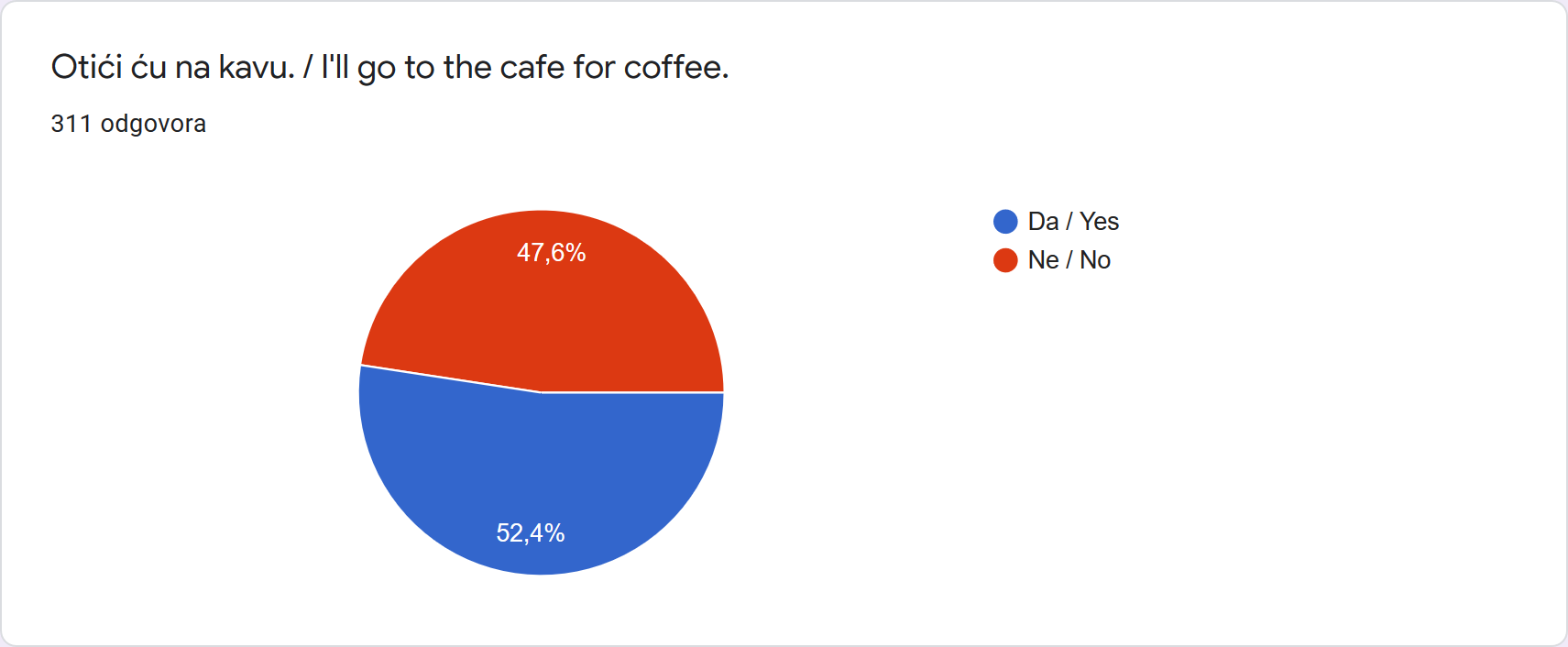
They are even less ready to leave their county, with a total of 55% negative answers.
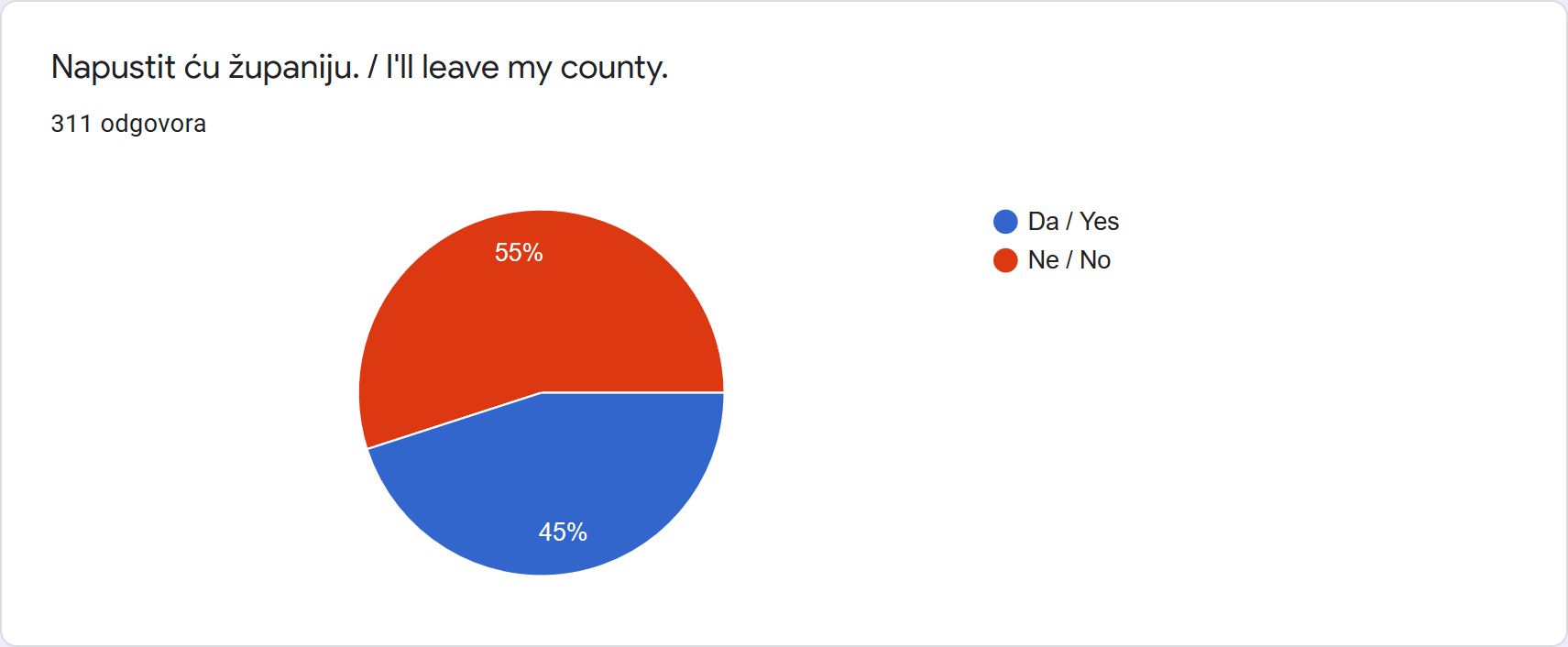
But, when it comes to visiting friends, here, the "yes" answer confidently wins with a total of 71,4%.
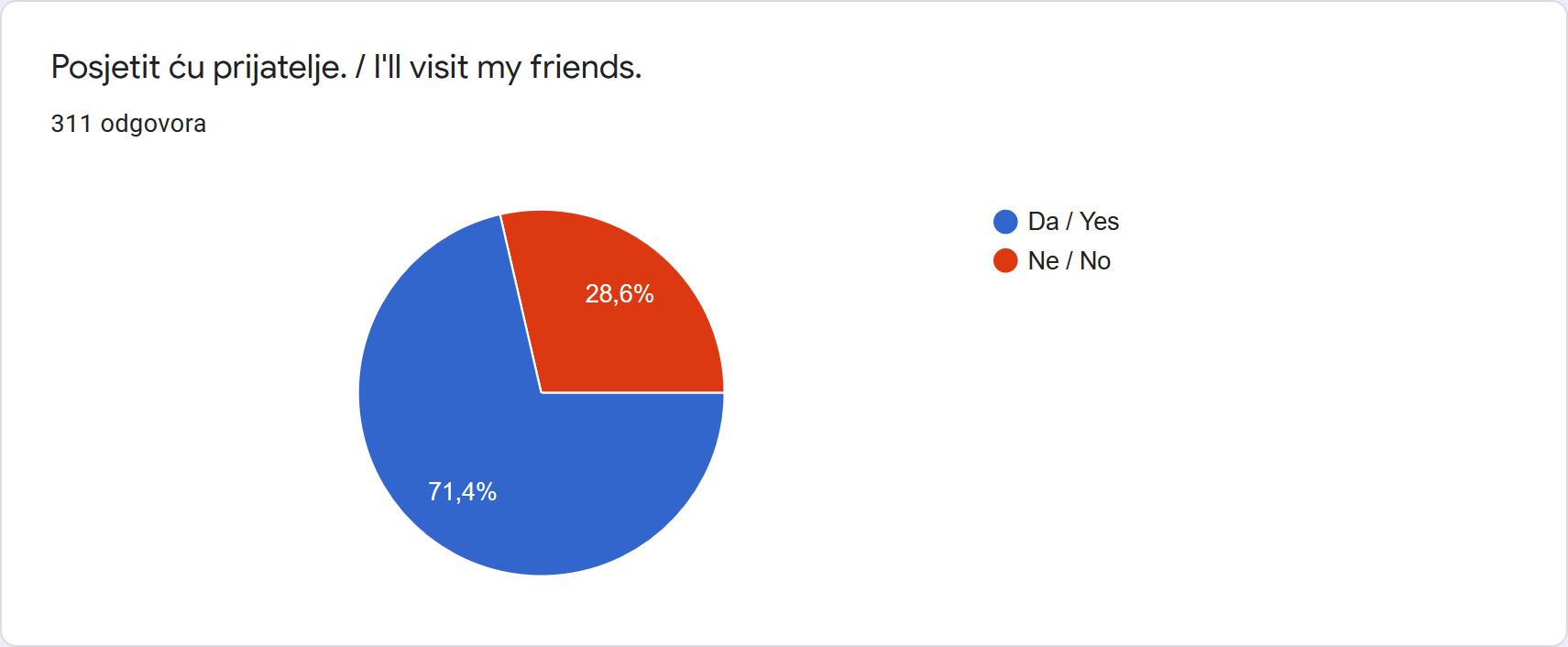
The caution when it comes to shopping is still here - 70,4% of people said they wouldn't go to shopping centers.
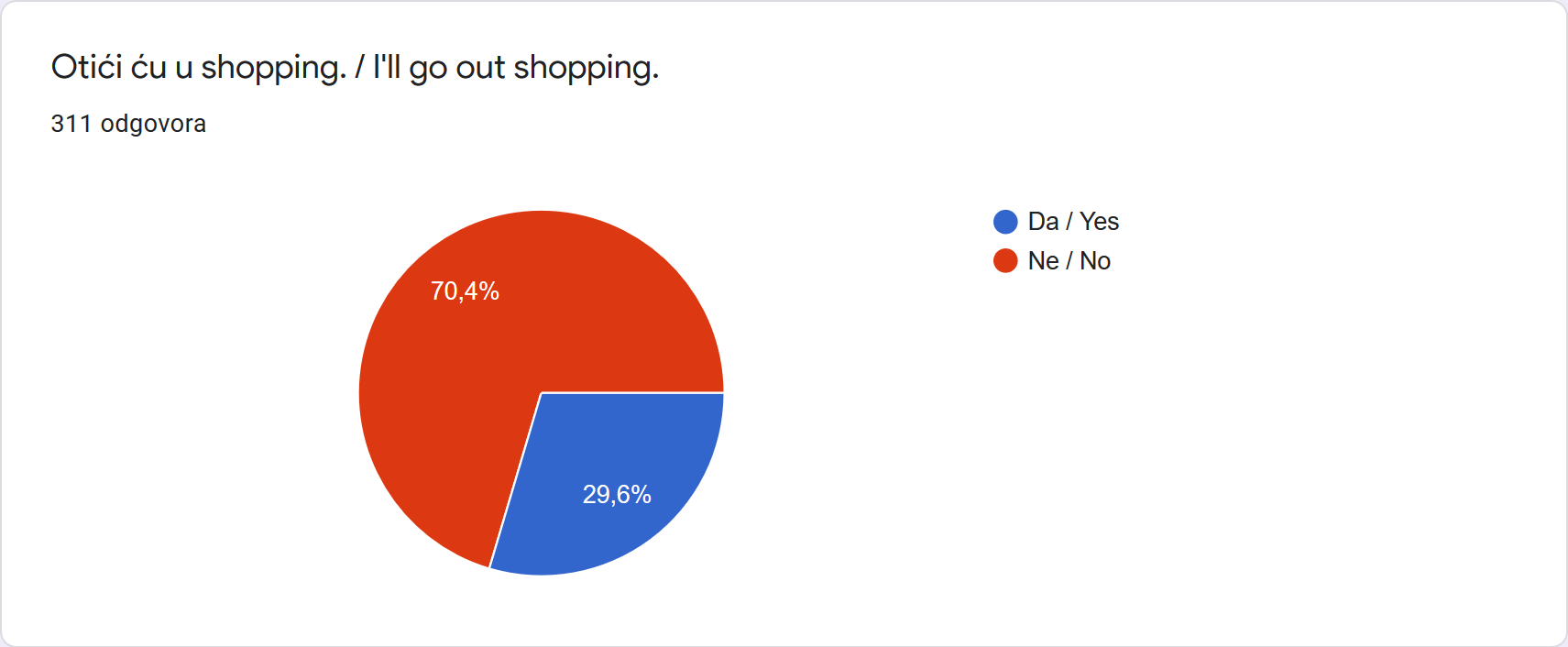
A little less than half of the people answered that they wouldn't stay home, which, after almost two months without that luxury, is understandable.
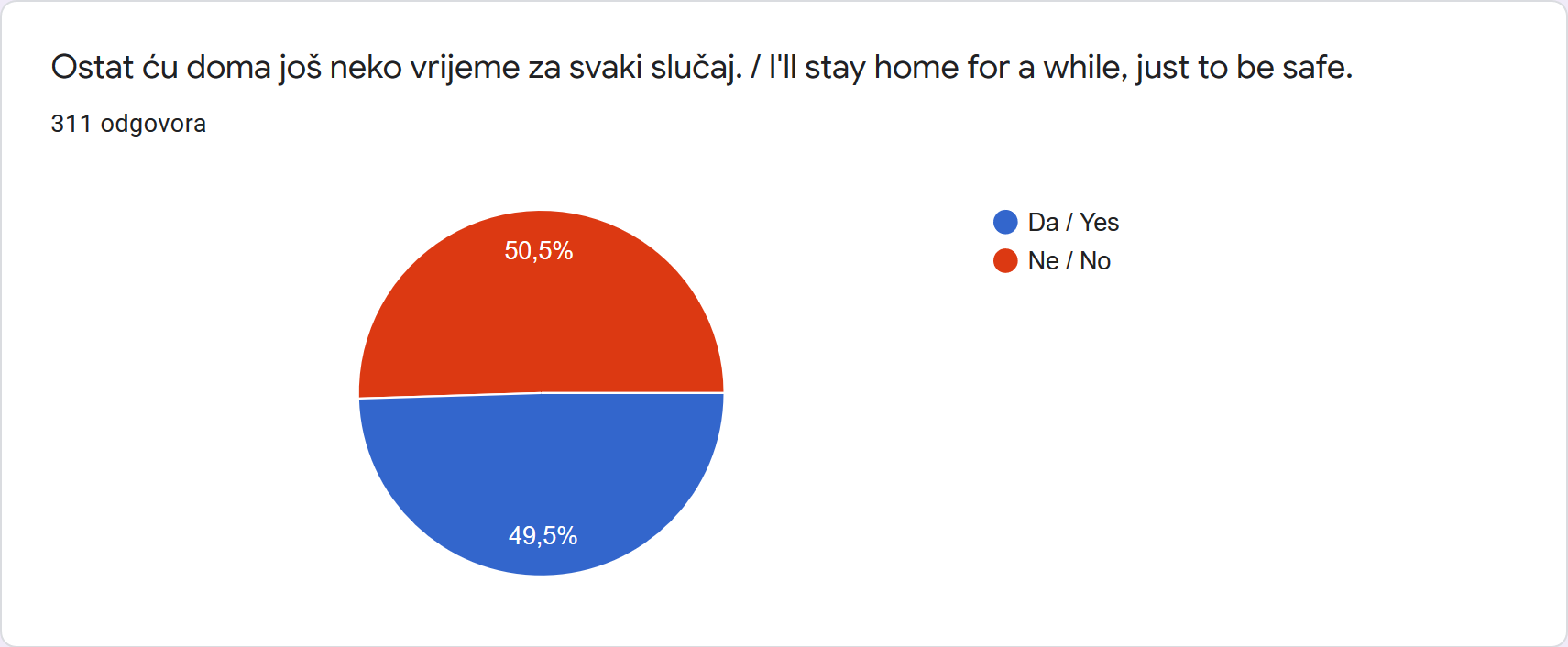
In the last statement, Croats showed responsibility once more - a total of 82,3% of people steal the show.
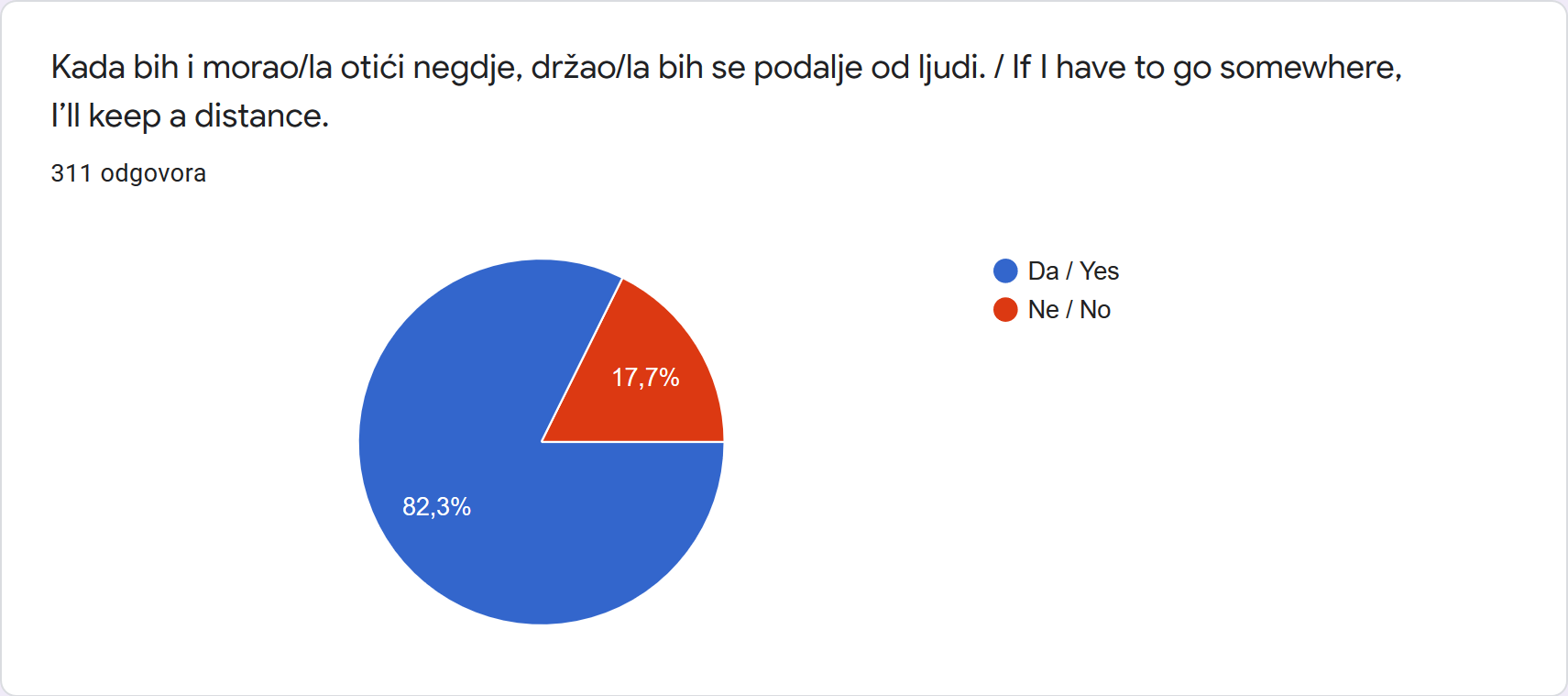
A little reminder for everyone: from tomorrow, gatherings of 40 people will be allowed, and e-passes are eliminated. Still, we are called to act responsibly.
Follow our live updates on the coronavirus crisis in Croatia.
Murter and Betina Quarantine Ends
April 19, 2020 — The first and only quarantine in Croatia is over.
Šibenik-Knin County announced there were no new positive cases of COVID-19 yesterday, and lifted quarantine measures for the Murter and Betina settlements.
The island of Murter was effectively cut off from the world on March 25, after an outbreak of the virus spread across the island. All told the island had 28 confirmed cases of COVID-19, with 14 residents ordered into self-isolation and 162 others undergoing medical checks.
Epidemiologists tested two random groups of people on Murter on April 15 and 16, looking for signs of community spread. The tests came back negative.
"Epidemiologists have concluded that there is no need to extend the quarantine measures for Murter and Betina," the county's Civil Protection Directorate said in a statement. "The quarantine measures for the settlements of Murter and Betina, which have been in force since March 25, 2020, are being abolished as of today."
According to epidemiologists, the current situation in Murter is good. There are still 12 currently in self-isolation. The last new COVID-19 diagnosis came nine days ago.
"Health recommendations are still in place," the directorate said. "All health care measures and guidelines must continue to be respected responsibly. That is why we appeal to all citizens again, stay in your houses, maintain hygiene and respect physical distance."
The virus's arrival on the otherwise secluded island miffed many. Local authorities suggested an asymptomatic tourist visiting earlier in the season may have brought the virus in early-March.


